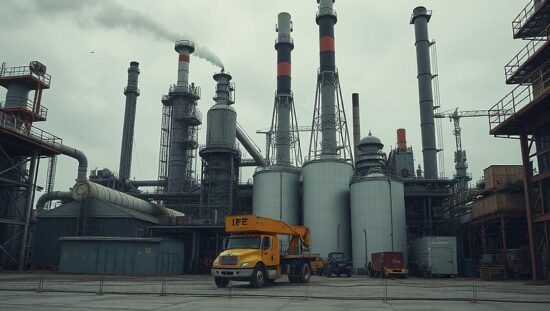Preliminary data released by Destatis, the Federal Statistical Office, paints a concerning picture of industrial output in Germany for August 2025, raising questions about the long-term health of the nation’s manufacturing sector and the efficacy of current government industrial policy. The adjusted industrial production within the manufacturing sector experienced a significant 4.3% decline compared to July 2025, revealing a deeper-seated weakness than previously anticipated.
Even more troubling is the three-month trend, showing a 1.3% reduction in production from June to August, despite a temporary uptick in July (+1.3% against the prior month). When compared to August 2024, production was down a substantial 3.9% on a calendar-adjusted basis. This consistent downward trend, especially considering the recent rebound attempts, signals a potential stagnation of German industrial capacity.
The dramatic fall in August is overwhelmingly attributed to the automotive industry, the largest single sector in Germany, which plummeted by a staggering 18.5% on a seasonally and calendar-adjusted basis against the previous month. While plant closures and production shifts are cited as contributing factors, critics argue that these short-term adjustments mask deeper problems surrounding the industry’s transition to electric vehicle production and increasing global competition. Government subsidies and long-term strategic planning appear to be failing to adequately support the sector through this critical phase.
Further exacerbating the situation, the machinery-building sector saw a contraction of 6.2%, reversing gains made in July. Weakness was also evident in the pharmaceutical industry (-10.3%) and the manufacturing of data processing equipment, electronic and optical products (-6.1%), reflecting broader global headwinds and potential vulnerabilities in specialized sectors.
Beyond the manufacturing heartland, the broader industrial picture is equally bleak. Industrial production, excluding energy and construction, experienced a 5.6% drop compared to July. All three major categories – investment goods, consumer goods and intermediate goods – registered declines, pointing to a widespread lack of demand and confidence. The slight rise in construction figures offers a marginal counterpoint, but does little to offset wider industrial concerns.
Looking back a year, industrial production fell 5.1% compared to August 2024, solidifying a consistent trajectory of decline. Even in energy-intensive industries, typically more resilient, a marginal increase in August against July was accompanied by a 2.7% drop in production over the three-month comparison and a 4.0% decrease compared to August 2024.
The data prompts a critical examination of government policies aimed at bolstering German industry. While efforts to incentivize investment and innovation are ongoing, the persistent weakness in key sectors demonstrates a potential disconnect between policy implementation and the realities facing businesses. The long-term consequences of this industrial slowdown could reverberate throughout the German economy, impacting employment rates and global competitiveness. The question now is whether further intervention and a more fundamental reassessment of industrial strategy, are necessary to avert a deeper and more protracted crisis.





